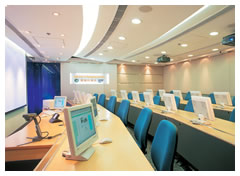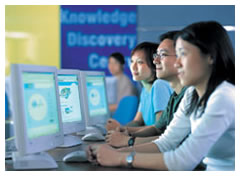"Out-of-the-box" experts can help
He strongly recommended that local logistics companies seek the advice of "out-of-the-box" experts, such as academics, both for information and strategic planning. Academics, with their extensive knowledge networks, access to world-wide research information, and professional research and analytical skills, could help in producing quality surveys and benchmarking exercises, in such areas as gauging
consumer response, conducting warehouse reviews, location analysis and cycle time reviews, said Dr Lam. "Partnership between academics and enterprises is a win-win situation. It would cost less for local companies to get things done, and our students taking courses in logistics management would have opportunities to explore real life situations."Logistics companies in the cyber era need a new generation of a knowledgeable, IT competent workforce. Universities, Dr Lam said, in collaboration with local enterprises, industry associations and the government, would provide the perfect training ground for the new blood.
Training future e-logistics experts
Dr Y C Chan, Associate Professor in the Department of Management Sciences, is another advocate of making use of academic expertise to provide solutions to logistics problems experienced by local companies. After all, he pointed out, more than half the faculty in the Department has been retrained using courses provided by the German software company SAP, the recognized leader in providing collaborative e-business solutions for all types of industries.
"It has been tough retraining the faculty, but we realized that we had to throw out a lot of the content of our logistics courses because the entire field has changed over the last few years."
The use of SAP software means that CityU students are now well-placed to receive the best training in e-logistics in Hong Kong. "Although we still teach theory and some of the basic mathematics, we like our students to get their hands dirty, to get hands-on experience."
In the SAP laboratory, students get to grips with the software, a programme so vast, Dr Chan said, that few people fully understand the giant network. "People know their area, e-logistics, is so enormous that we rely on consultants and experts knowing sections of the software very well. It covers many aspects: e-procurement, production planning, and supply, and so on."
With the benefit of their SAP training and their familiarity with developments in the local business scene, Dr Chan believes that management sciences graduates from CityU will be well able to meet the needs of Hong Kong's logistics companies.


